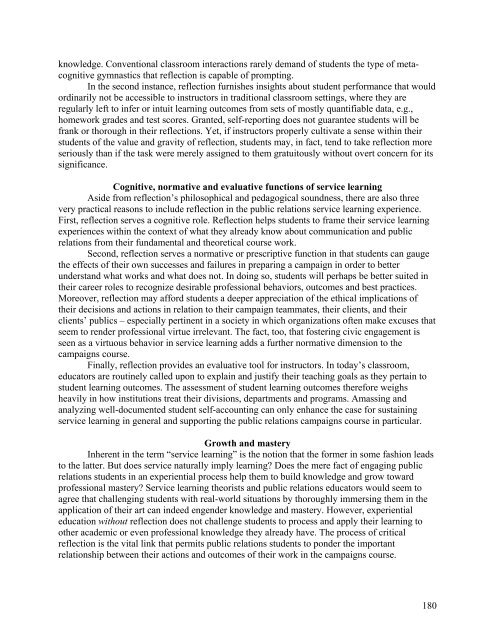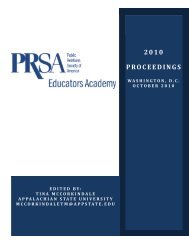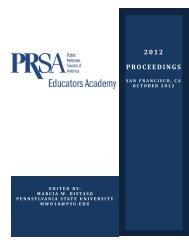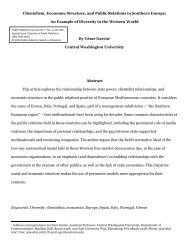2008 PROCEEDINGS - Public Relations Society of America
2008 PROCEEDINGS - Public Relations Society of America
2008 PROCEEDINGS - Public Relations Society of America
You also want an ePaper? Increase the reach of your titles
YUMPU automatically turns print PDFs into web optimized ePapers that Google loves.
knowledge. Conventional classroom interactions rarely demand <strong>of</strong> students the type <strong>of</strong> metacognitive<br />
gymnastics that reflection is capable <strong>of</strong> prompting.<br />
In the second instance, reflection furnishes insights about student performance that would<br />
ordinarily not be accessible to instructors in traditional classroom settings, where they are<br />
regularly left to infer or intuit learning outcomes from sets <strong>of</strong> mostly quantifiable data, e.g.,<br />
homework grades and test scores. Granted, self-reporting does not guarantee students will be<br />
frank or thorough in their reflections. Yet, if instructors properly cultivate a sense within their<br />
students <strong>of</strong> the value and gravity <strong>of</strong> reflection, students may, in fact, tend to take reflection more<br />
seriously than if the task were merely assigned to them gratuitously without overt concern for its<br />
significance.<br />
Cognitive, normative and evaluative functions <strong>of</strong> service learning<br />
Aside from reflection’s philosophical and pedagogical soundness, there are also three<br />
very practical reasons to include reflection in the public relations service learning experience.<br />
First, reflection serves a cognitive role. Reflection helps students to frame their service learning<br />
experiences within the context <strong>of</strong> what they already know about communication and public<br />
relations from their fundamental and theoretical course work.<br />
Second, reflection serves a normative or prescriptive function in that students can gauge<br />
the effects <strong>of</strong> their own successes and failures in preparing a campaign in order to better<br />
understand what works and what does not. In doing so, students will perhaps be better suited in<br />
their career roles to recognize desirable pr<strong>of</strong>essional behaviors, outcomes and best practices.<br />
Moreover, reflection may afford students a deeper appreciation <strong>of</strong> the ethical implications <strong>of</strong><br />
their decisions and actions in relation to their campaign teammates, their clients, and their<br />
clients’ publics – especially pertinent in a society in which organizations <strong>of</strong>ten make excuses that<br />
seem to render pr<strong>of</strong>essional virtue irrelevant. The fact, too, that fostering civic engagement is<br />
seen as a virtuous behavior in service learning adds a further normative dimension to the<br />
campaigns course.<br />
Finally, reflection provides an evaluative tool for instructors. In today’s classroom,<br />
educators are routinely called upon to explain and justify their teaching goals as they pertain to<br />
student learning outcomes. The assessment <strong>of</strong> student learning outcomes therefore weighs<br />
heavily in how institutions treat their divisions, departments and programs. Amassing and<br />
analyzing well-documented student self-accounting can only enhance the case for sustaining<br />
service learning in general and supporting the public relations campaigns course in particular.<br />
Growth and mastery<br />
Inherent in the term “service learning” is the notion that the former in some fashion leads<br />
to the latter. But does service naturally imply learning? Does the mere fact <strong>of</strong> engaging public<br />
relations students in an experiential process help them to build knowledge and grow toward<br />
pr<strong>of</strong>essional mastery? Service learning theorists and public relations educators would seem to<br />
agree that challenging students with real-world situations by thoroughly immersing them in the<br />
application <strong>of</strong> their art can indeed engender knowledge and mastery. However, experiential<br />
education without reflection does not challenge students to process and apply their learning to<br />
other academic or even pr<strong>of</strong>essional knowledge they already have. The process <strong>of</strong> critical<br />
reflection is the vital link that permits public relations students to ponder the important<br />
relationship between their actions and outcomes <strong>of</strong> their work in the campaigns course.<br />
180
















